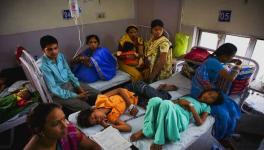COVID-19: New Guidelines Say No Tests for Patients with Mild Symptoms Before Discharge, Experts Wary of Move
Representational Image.
The Ministry of Health and Family Welfare (MoHFW) released revised guidelines for discharging COVID-19 patients late on Friday evening, maintaining that infected patients with mild or moderate symptoms need not be tested before their discharge. Earlier, the patients had be tested twice with negative results on both occasions before being discharged.
The ministry said: “Mild/very mild/pre-symptomatic cases admitted to a Covid Care Facility will undergo regular temperature and pulse oximetry monitoring. The patient can be discharged after 10 days of symptom onset and no fever for 3 days. There will be no need for testing prior to discharge. At the time of discharge, the patient will be advised to follow the home isolation for further 7 days as per guidelines.” The ministry reportedly said that the guidelines were revised after consulting a study from Germany and according to guidelines by issued by the Centre for Disease Control and Prevention in the United States.
The guidelines further said that at any point of time prior to discharge, if the oxygen saturation (fraction of oxygen-saturated hemoglobin relative to total hemoglobin in the blood) dips below 95%, the patient will be moved to Dedicated COVID Health Centre (DCHC). “After discharge from the facility, if he/she again develops symptoms of fever, cough or breathing difficulty he will contact the COVID Care Centre or State helpline or 1075. His/her health will again be followed up through tele-conference on 14th day,” the guidelines said.
The ministry defined patients with moderate symptoms as those whose symptoms were resolved within three days and could maintain oxygen saturation of above 95% for the next four days.
However, the guidelines do not seems convincing to doctors and medical experts who emphasise that the move may turn disastrous if conducted without caution and associated procedures. Dr T. Sunder Raman from the Jan Swasthya Abhiyan told NewsClick that Covid Care facilities can discharge the patients if they do not have fever or related issues followed by seven further days without any symptoms. If the patient does not show symptoms it means that the anti-bodies are effectively responding to the virus, he said. However, he added that the facility must ensure that the patient undergoes a through anti-body test to see if they have ample anti-bodies in the body to contain the virus.
Dr Srinivas Rajkumar T, Secretary, Resident Doctor’s Association, AIIMS, told NewsClick that the decision was a “disaster in the making. It appears that the Central Government has deprived the states of funds in the name of PMCARES and also left them to handle the pandemic all by themselves. People who will be sent back untested may shed the virus and spread it in the community. What was the government doing for 40 days if not arranging for enough testing facilities? Is it ready to sacrifice 2 lakh Indians or more to COVID-19 based on estimates?” he asked.
Senior Geriatrician Dr. Harjit Singh Bhatti said there was no unanimous opinion on the incubation of the virus. He said that some cases from South Korea suggest that the virus may remain active even for two months. “Additionally, the government should come out with its own understanding of the virus about how many days it can remain active for and how they further see the trajectory of cases. It is beyond comprehension that the government of India has not come out with its own evidence based study even after witnessing 50,000 cases and 1000 deaths. It is quite clear now that we have a different pattern of pandemic in the country in comparison with rest of the world as we have neither a similar growth nor mortality rate. So, it should clearly inform people about the Indian experience of the pandemic and stop relying on studies based in western countries,” he said.
Dr Bhatti added that the revised guidelines should be seen in the light of recommendations by medical experts “that we may see an explosion of cases in June and July. Thus, it clearly shows that the government does not have enough test kits even today. It shows that it is avoiding repeat tests and wishes to save them for the future.”
Get the latest reports & analysis with people's perspective on Protests, movements & deep analytical videos, discussions of the current affairs in your Telegram app. Subscribe to NewsClick's Telegram channel & get Real-Time updates on stories, as they get published on our website.
























